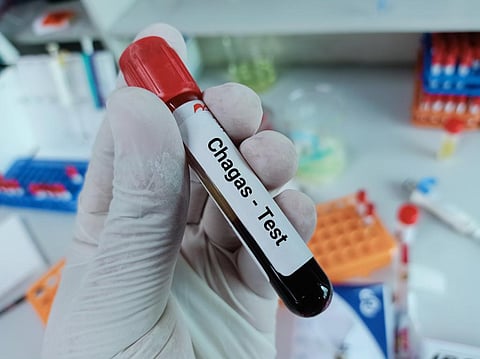

The World Health Organization (WHO) is observing World Chagas Disease Day April 14, 2023 to raise awareness about this little-known disease that affects millions every year, especially the poor population and people in Latin America.
In 2019, the 72nd World Health Assembly dedicated this day to the disease. This year’s theme is “time to integrate Chagas disease into primary health care”.
In his message to commemorate the day, WHO director-general, Tedros Adhanom Ghebreyesus said, “WHO is committed to working side-by-side with all affected countries to increase their ability to prevent, find, report and provide care for every single case, to defeat Chagas disease.”
Chagas disease, also called American trypanosomiasis, is a communicable parasitic disease that has infected 6-7 million people and claims around 12,000 lives every year across the globe, according to WHO.
The systemic, chronic disease manifests as fever, headaches, rashes and inflammatory nodules, nausea or diarrhoea and muscle or abdominal pain. A majority of the patients (70-80 per cent) show an asymptomatic clinical course throughout their lives, making early detection challenging. It is often referred to as the “silent and silenced disease”, the WHO noted.
Around 20-30 per cent infections evolve into the chronic stage, during which patients show symptoms indicating damage to tissues of heart, digestive system or nervous system.
It is caused by the parasite protozoan Trypanosoma cruzi. The parasites are mainly transmitted by a family of bugs called ‘triatomines’, also known as the ‘kissing bug’. These blood-sucking bugs transmit the disease from infected to healthy individuals through bites and by defecating on them.
An individual can also contract this disease through congenital transmission (pregnant woman to their baby), blood transfusions, organ transplantation, consumption of uncooked food contaminated with faecal matter of infected bugs or even accidental laboratory exposure. The disease, however, cannot propagate by casual contact with infected humans or animals.
The disease is named after physician Carlos Chagas who first detected it in a Brazillian child in 1909.
Since then, the disease remains most prevalent in Latin America, with the poor facing the highest risk. The most important vectors are found in the rural parts of Argentina, Bolivia, Brazil, Chile, Paraguay, Uruguay, Peru, Colombia, Venezuela, Ecuador, Panama, and Central America.
Rare cases of Chagas disease have been reported in the southern United States as well. Over the past decades, stray cases of Chagas have been reported outside of the Americas, in many European and some Latin, Eastern Mediterranean and Western Pacific countries, according to WHO.
Chagas is currently endemic in 21 countries in the Americas, and shows an annual average incidence of 30,000 new cases, according to Pan-American Health Organisation.
According to an estimate by the Centers for Disease Control and Prevention (CDC), Chagas disease accounts for atleast $627 million in global healthcare-related costs annually.
There are currently no vaccines available for Chagas disease. However, the disease can be treated with antiparasitic medicines Benznidazole and Nifurtimox. These have a 100 per cent efficacy rate if the medicine is administered at the onset of the acute stage.
Preventive measures have been put in place by countries to eliminate the bugs or reduce infections. Governments have employed spraying insecticides as a measure to eliminate triatomine bugs in parts of Mexico, Central and South America.
Universal screening of blood donors and blood products is done by all Latin American countries, and other countries reporting new cases. Several countries have also scaled up interventions to eliminate the risk of congenital transmission.